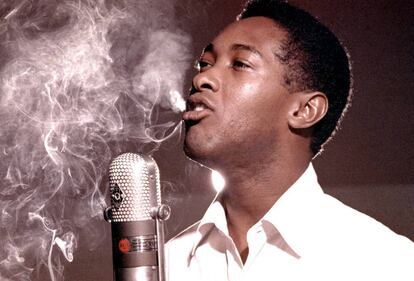Musical Crimes (3): Sam Cooke, the fallen angel

Strictly opinion pieces that reflect the author's unique style. These opinion pieces must be based on verified data and be respectful of individuals, even if their actions are criticized. All opinion columns by individuals outside the EL PAÍS editorial team will include, after the last line, a byline—no matter how well-known the author may be—indicating their position, title, political affiliation (if applicable), or main occupation, or any that is or was related to the topic addressed.

I suspect that the rediscovery of Sam Cooke 's sublime art began with that famous scene in Witness (1986) where his Wonderful World is played. Remember: the character played by Harrison Ford reveals to the naive Amish girl (Kelly McGillis) the power of music to unleash emotions, in the face of her father's scandal.
The hallmark of Sam Cooke's life was movement: born in Clarksdale, Mississippi, one of the birthplaces of the blues. His father, a Baptist preacher, joined the Great Migration, and the (large) family ended up in Chicago. There was an urgent need to bring food home, and young Sam joined groups that toured the so-called Gospel Highway, the church circuit. At 19, he joined the powerful Soul Stirrers, a group where he played the role of the sweet man , the pretty boy who sought to excite the female audience. Contrary to what one might imagine, gospel is a highly sexualized music, where many stars lead, let's say, intense lives. Sam, who married twice, had several children out of wedlock, although this did not affect his popularity.
With a striking appearance, Cooke possessed a flexible voice and a capacity for improvising with unexpected embellishments. He injected the most banal verses with an extraordinary emotional intensity that made one, um, weep. Unfortunately, there are no recordings of his nightclub performances; he can only be seen in television studios, performing as an entertainer.
He didn't go through the crises of conscience so beloved by screenwriters. He recorded secular music while still dependent on religious audiences. Outside the ghetto , he launched into broad-spectrum pop with Italian-American producers Hugo Peretti and Luigi Creatore . As a true creature of showbiz , he starred in tributes to Billie Holiday and Nat King Cole, but he balanced this with his pursuit of the youth market. With very attentive ears, he recognized the rebellious anthem quality of "Blowin' In the Wind." Dylanesque, and beyond recording it, he was determined to create something similar that reflected his experience as an African American. This would lead to the sublime A Change Is Gonna Come , a majestic expression of the need for social change, emphasizing its inevitability.
Cooke was no gullible man: he knew that power isn't given, it's earned, even in the record business. He founded SAR Records in 1961 to develop his skills as a producer and launch friends like Bobby Womack and Johnnie Taylor. A 2020 Amazon film, One Night in Miami..., fictionalizes his clash with activist Malcolm X over Black empowerment tactics.
Sam preferred compromise. He teamed up with the astute Allen Klein, before the latter worked with the Beatles and the Rolling Stones; in fact, Klein would eventually acquire the rights to Cooke's publishing and recording catalog. But that would come after the disaster of December 11, 1964, in Los Angeles, when the singer made several mistakes.
That night, Sam went out to have fun in his red Ferrari. He easily hooked up with a beautiful woman, Elisa Boyer, of Chinese descent. They ended up at the Hacienda Motel, an establishment with a dubious reputation (they charged three dollars an hour), where they registered as married. Then, according to Elisa's troubled version, the singer tried to rape her. When Sam entered the bathroom, she took the opportunity to escape, taking her clothes and those of the singer. An enraged Sam Cooke, naked except for a jacket, showed up at the motel reception, asking where the hell his companion was. Someone more streetwise might have suspected he was falling victim to a common trick used by some of Los Angeles prostitutes.
The manager felt threatened and used her revolver. Correct to the end, Cooke expressed his shock: "Ma'am, he shot me." Not content with just shooting him, the woman beat him with a broom until he stopped moving. The subsequent investigation determined it was "justifiable homicide." It was little consolation that, years later, Elisa Boyer was convicted of killing her boyfriend.
EL PAÍS






